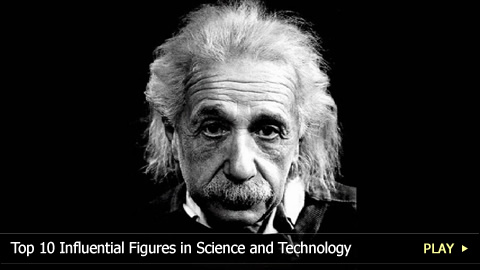Top 10 Influential Figures in Science and Technology

#10: Charles Darwin
(1809 - 1882)
Charles Darwin’s 1859 book, “On the Origin of Species,” created a sensation that still reverberates throughout the world. Darwin’s theory of evolution outraged many religious leaders and challenged assumptions about the world, but its principles are now accepted as fact and borne out by scientific inquiry. Modern evolutionary theory has itself evolved, but its roots are clearly recognizable in Darwin’s brilliant theory.
#9: The Wright Brothers
(Orville: 1871 - 1948; Wilbur: 1867 - 1912)
While there may be other aviation pioneers who also deserve recognition, Orville and Wilbur Wright are generally hailed as the first to successfully create a manned flying machine. This accomplishment made possible the development of the entire aviation industry. The world was made smaller by the airplane, as people and goods could travel great distances in a short amount of time. World economy, tourism and the defense industry were never the same.
#8: Marie Curie
(1867 - 1934)
The word “radioactivity” was conceived by Marie Curie, and her work in that field is what she is chiefly remembered for, as she created the theory of radioactivity and developed techniques for isolating radioactive isotopes. The first woman awarded a Nobel Prize – which she won for both physics and chemistry – Curie also discovered the elements polonium and radium and helped develop the x-ray.
#7: Nikola Tesla
(1856 - 1943)
Thomas Edison gets all the glory for his work in electricity, and while he was a good scientist, Nikola Tesla was even more important. Tesla’s groundbreaking work led to the alternating current electric power system, which was crucial in industrial development. A man of many interests, Tesla also made significant contributions to the field of robotics, nuclear physics, ballistics, electromechanical engineering, radar, radio, theoretical physics and computer science. The man definitely got around.
#6: Leonardo da Vinci
(1452 - 1519)
Although more celebrated as an artist, Leonardo da Vinci also had an astounding scientific mind. For example, his “Vitruvian Man” drawing is an example of ideal human proportions. Da Vinci also made numerous designs, few of which were realized, for such items as flying machines, tanks, calculators and plant studies. He even created an early basic theory of what is now called plate tectonics. Who knows how science would have been altered if more of his scientific work had been published during his lifetime?
#5: Archimedes
(287 - 212 BC)
The greatest mathematician of ancient times, and one of the greatest of all time, Archimedes was also a physicist, inventor, astronomer and engineer. He created the principle by which the volume of an irregularly shaped object can be determined, which has had enormous influence down through the ages. Some of his designs have been disproved – including one which outlined a way to set a ship on fire using mirrors; but much of his work stands the test of time.
#4: Johannes Gutenberg
(1395 - 1468)
Many of the scientists on this list spent their lives devoted to scientific exploration; Johannes Gutenberg is here because of one major invention. Gutenberg came up with the concept of mechanical movable type printing, which, in one fell swoop, altered the world of printing – and with it the dissemination of information. Mass production of printed material suddenly became a reality, and remained the biggest advance in communications until mass media and the Internet.
#3: Isaac Newton
(1642 - 1727)
The story of an apple hitting Sir Isaac Newton on the head and the scientist all of sudden discovering the law of gravity is oversimplified – but hey, it’s a good story. Newton’s accomplishments include the “Principia,” which many consider the most influential book in scientific history and which laid out the famous three laws of motion. Modern physics and engineering owe him a huge debt of gratitude.
#2: Aristotle
(384 - 322 BC)
Famous Greek philosopher Aristotle is equally renowned as a scientist; indeed, many consider him history’s first genuine scientist. Geology, biology, physics, medicine, psychology and meteorology were among his passions. Although many of his conclusions do not stand up to modern science, his efforts laid important groundwork that influenced scientific belief through the Renaissance and into the Enlightenment. Modern science would not be where it is today without his early contributions.
Before we reveal our top pick, here are a few honorable mentions:
- Alan Turing (1912 - 1954)
- Galileo Galilei (1564 - 1642)
- Max Planck (1858 - 1947)
- Louis Pasteur (1822 - 1895)
- Enrico Fermi (1901 - 1954)
#1: Albert Einstein
(1879 - 1955)
With his rumpled clothes and wacked out hair, Albert Einstein may be the most lovable scientist on our list – but he’s number one because of his accomplishments. His theory of relativity revolutionized the field of physics, and his discovery of the photoelectric effect led to what we now know as quantum theory. Practically everyone knows Einstein’s famous “E=mc2” even if we can’t really explain it; we just know that it changed the world we live in.
Do you agree with our choices? What other scientific geniuses should we have added to this list? For more methodical top 10s published daily, be sure to subscribe to WatchMojo.com.


 1
1
 0
0
 flagged
flagged

 0
0
 0
0
 report
report